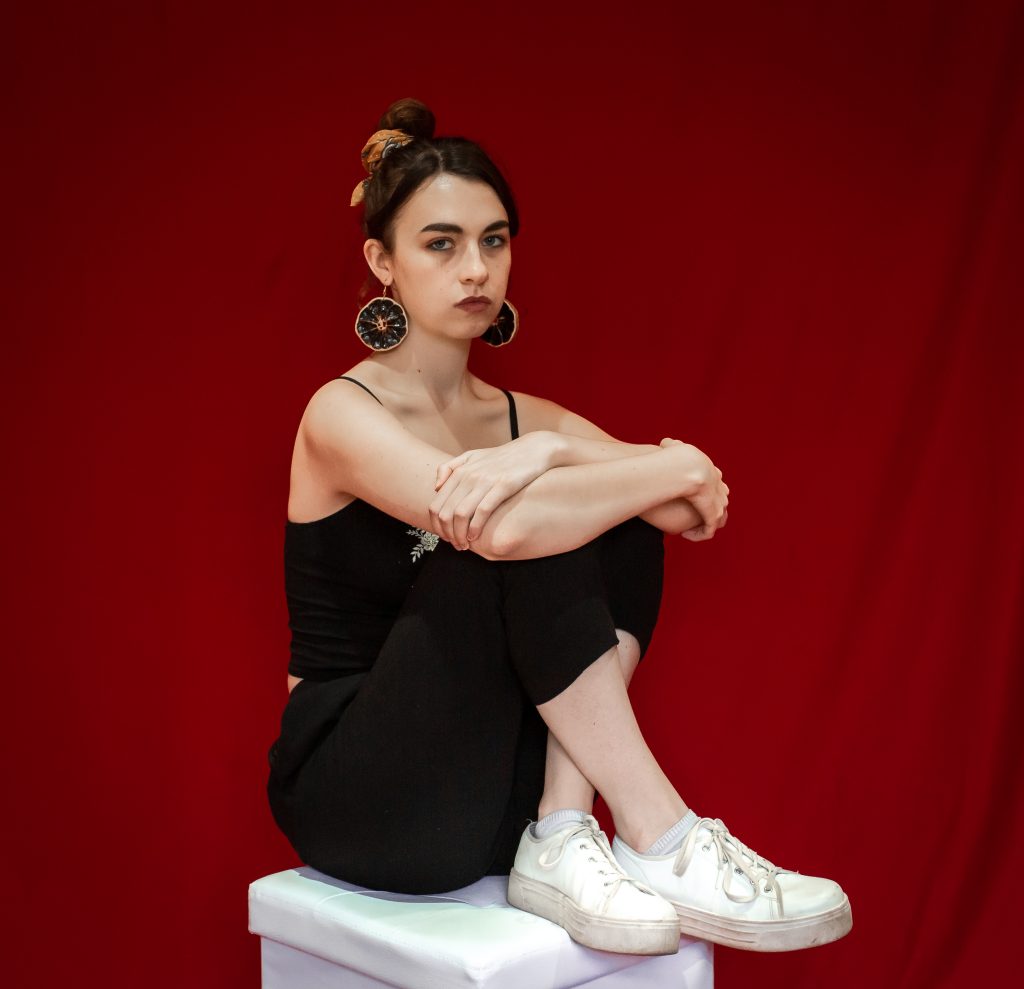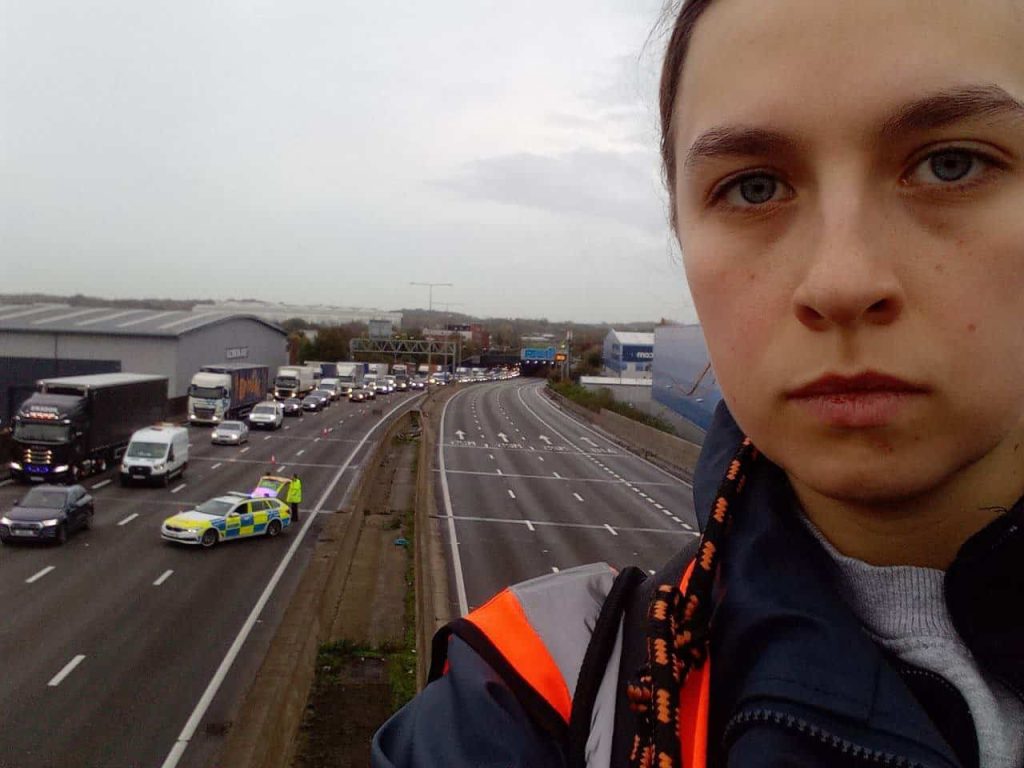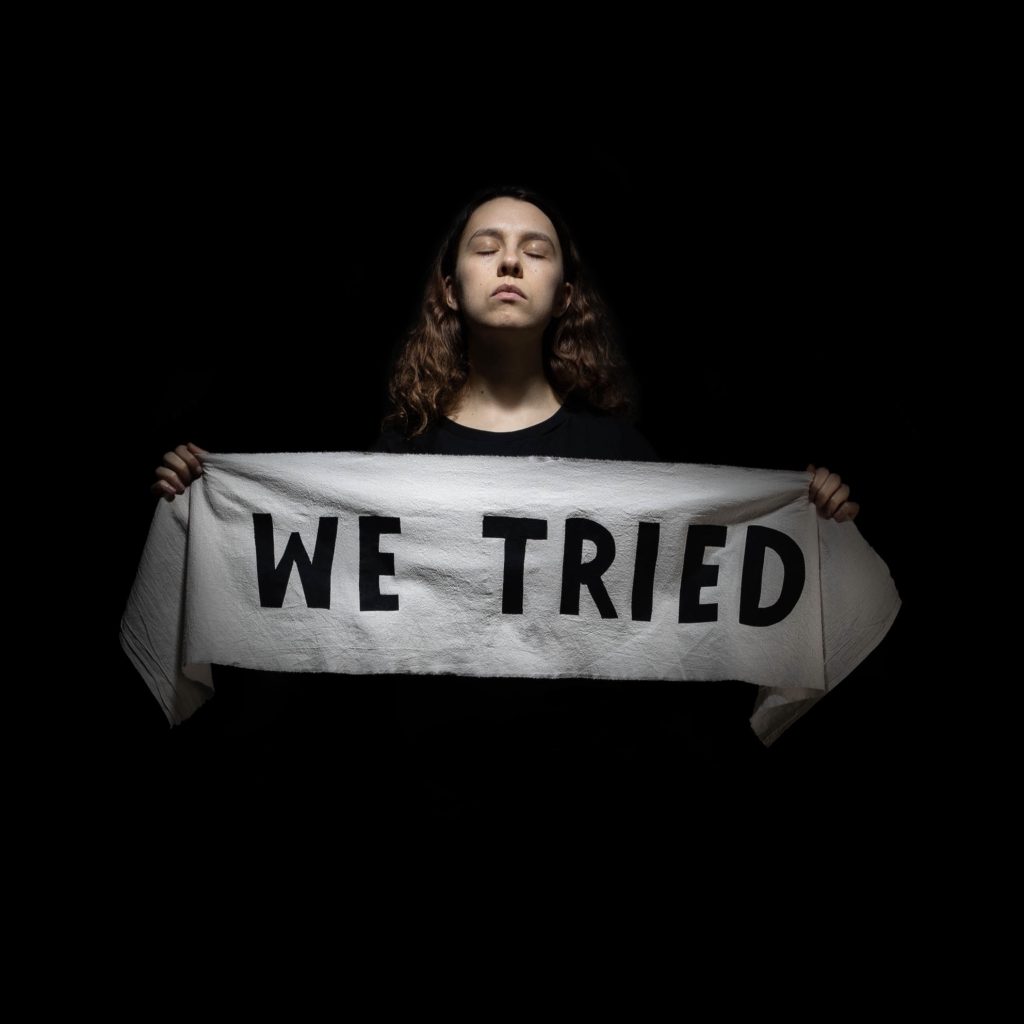With Chris Packham calling for it to be this year’s Christmas No.1, Louise Harris’s new climate single, “We Tried”, hit No.1 in the UK iTunes Singles Chart one week after its release, overtaking the likes of Dua Lipa and The Beatles.
The climate anthem, also backed by Brian Eno and Christiana Figueres (Chief Negotiator of the 2015 Paris Agreement), immediately entered the Big Top 40 Chart from Global – announced No.27 on Sun 26th Nov and No.26 on Sun 3rd Dec. This is the first time a song about the climate crisis has achieved such popularity. Louise will be donating all proceeds to climate causes.
Up until now, Louise was only known for being the Just Stop Oil protestor who filmed herself crying on top of a gantry over the M25, her emotional testimony going internationally viral this time last year. This protest led to Louise’s arrest, and she was remanded to prison for 8 days. She has now re-entered the public eye, however, with a powerful song and music video “about the climate crisis and what will happen if we don’t act”. She recently sang the song outside of Rishi Sunak’s house as part of a Just Stop Oil protest and was unexpectedly arrested.
Now facing a suspended sentence, Louise has turned to music to express her grief, despair and anger at the escalating climate crisis and lack of appropriate action from governments.


“We Tried” is deliberately written from the perspective of our currently projected future of irreversible climate catastrophe (“We ran out of time…oh well, we tried”). Louise hopes this song will allow people to feel how they would feel if this future happened – and then use that feeling to spur themselves into the only hopeful solution left: collective climate action.
The powerful music video, which has already been shared by Chris Packham, Brian Eno, Adam McKay, Christiana Figueres and Dave Goulson, centres on a tear-stricken Louise and is interspersed with childhood videos, footage of politicians, climate victims and activist movements past and present. The emotive lyrics talk of an avoidable defeat: “Well, maybe we were meant to win… but not enough good drowned out the sin… they watched the world cave in”.
The video fades to footage of Louise’s famous gantry action where she pleads through tears: “I’m here because I don’t have a future…Why does it take young people like me, up on a f***ing gantry on the M25, for you to listen?”.
It ends with the message: “It’s not too late to avoid irreversible climate catastrophe. “There is a rapidly closing window of opportunity to secure a liveable and sustainable future for all” (IPCC Report, March 2023). We have time – but not for long. Join collective action today.”
Louise explains:
“I wrote “We Tried” back in July 2022, three days after my 24th birthday, an age which children born today may never reach. The song expresses feelings of grief, anger, a longing to be taken somewhere else, and exhaustion at living in a world where you are constantly being gaslit – by the media, politicians, and, hardest of all, by people you love.
The message of my song and video is this: The climate crisis affects me and my family, you and yours. Noone is exempt. It has been created by a few handfuls of people in power who, I’ve concluded, must not know what love is. But what matters is – I know what love is. You know what love is. We know. And together, we outnumber the people in power 8 billion times over. So what are we waiting for? We must come together, and act – not as individuals, but as a collective – through civil disobedience; protest; a mass movement. Can we truthfully say ‘we tried’?
Where are all the songs and films and plays about this life-threatening emergency? Music and art have a unique power to move people emotionally, and empower them into action. Historically, they have been instrumental in bringing about social change, in sparking revolutions. It’s time to do it again. After all – if art can’t change the world, what can?”
This climate anthem is just the beginning of Louise’s music activism journey, with plans to release an entire climate album in 2024, if she reaches her goal of £20,000.
“It’s a beautiful song. It’s melodic. It’s ‘catchy’, it’s ’pop’, it’s ’sing-along’. It’s lovely, isn’t it…? No, it isn’t. It’s fucking horrific, terrifying and tragic. Listen to it, hear every desperate note, each lingering plea. Don’t just look at, see the pictures. Read the music, read the room, our planet’s youth in abject distress. This is their voice, their cry, their tears laid bare. So ask yourself: do you want this to be the ultimate anthem for doomed youth, a threnody for their funeral? It’s beautiful, beautiful for its razor sharp honesty, beautiful for its truth, beautiful for its purity of frightened heart. Please listen, please learn, please act”.
– Chris Packham, Naturalist and TV Broadcaster
“I often talk about facing the climate and ecological crises head on: not shying away from the pain and in fact using it to generate the clarity of what needs to be done. Here’s a young woman doing just that with this song: musician and activist Louise Harris. A powerful song. Thank you Louise.”
– Christiana Figueres, Former UN Climate Change Executive Secretary & Chief Negotiator of landmark 2015 Paris Agreement
“It is the young who will reap the global heating whirlwind that we have sown, but their voices are being ignored and their protests shut down at every opportunity. What better way than music for them to announce their fears and demands to a world that has to listen.”
– Bill McGuire, Professor Emeritus of Geophysical & Climate Hazards, UCL
“This beautiful and moving song is a powerful weapon. We need to wake up to the cowardly inertia of our governments, to the greedy shortsightedness of business-as-usual, and to the numbing distractions of the media. This song woke me up. I hope it gets centuries of airtime.”
– Brian Eno, musician and producer
ENDS
Contact
Louise Harris – Available for interview: 07725 190544, louiseharrismusic@gmail.com
Song here. Video here. Photos here. Downloadable audio here.
Notes to Editors
Louise Harris is a 25-year-old singer-songwriter who grew up in a small town in Hertfordshire. She started writing songs during her second year of university, aged 19, an art she has since fallen in love with.
After graduating university with a psychology degree, Louise worked in various hospitality jobs whilst pursuing a music career. In 2021, she went TikTok viral with her song ‘dating me is like a Cambridge term’ (over 500,000 views) which BBC Radio 6’s Tom Robinson featured on his Introducing Mixtape, comparing it to the “revenge songs of Bob Dylan and Lily Allen”. Her recent 2023 pop-punk [2.0] version was worked on with award-winning producer Jonathan Quarmby.
Following being picked up by Amie Dibba from Ferocious Talent, which led to her signing to Ferocious Talent Publishing, Louise wrote and sung the top-line for hit single “Change Of Heart” (13 million Spotify streams), co-released in Dec 2021 with major producers SOMMA & Paul Schulze, via the highly reputed house label ‘Selected’. Dance music is one of Louise’s favourite genres, as are pop & singer-songwriter. Her musical influences include Coldplay, Imagine Dragons, Lily Allen, Amy Winehouse, James Arthur, Matt Maltese and RAYE.
Having spent the most part of 2022 being arrested and even imprisoned for taking non-violent direct climate action with Just Stop Oil and Animal Rising, Louise is now seeking to release music that enables people to emotionally connect with this existential threat, and be moved and empowered to collectively fight it.
If art can’t change the world, what can?

